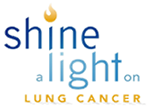Since 1987, more women have died each year from lung cancer than from breast cancer. There are many reasons for this statistic, including the efforts made by the Susan G. Komen for the Cure to increase the number of women doing self-checks and getting annual mammograms. Unfortunately, there are not many screenings that can be done to detect lung cancer in early stages. Certainly not any that are low cost and/or covered by a traditional medical insurance policy.
There are efforts currently being promoted at a legislative level to encourage insurance companies to cover screenings for those at high risk, but the argument being presented by those opposing the action is that lung cancer is primarily developed by people who choose to take up an optional habit. They claim that when a person starts smoking they know the risk, and it's their choice to light up. Admittedly, that is the case. But the problem is, smoking is not the only high-risk factor out there. According to the National Cancer Institute, the major risk factors for lung cancer are:
- Smoking - cigarettes, pipes, and cigars are all carcinogenic;
- Secondhand smoke;
- Family history;
- Environmental risks.
A workplace can also be a source of cancer risk. Environmental exposures that cause a higher risk for cancer include exposure to radon gas, asbestos, arsenic, chromium, nickel, tar and soot. A long list of industrial and labor jobs can involve exposure to these substances. Unfortunately, the people who work around these substances but who do not smoke are lumped into the same "you brought it on yourself" group that smokers are put in by those who don't understand the broad reach of this disease.
Until the negative stigma of lung cancer is reduced, there is little an at-risk individual can do except be aware of the signs and symptoms of lung cancer and their own risk. Stop smoking today or encourage your loved-ones to do so. We have certified tobacco counselors on staff who can help. Contact Casey Shelor for information at 479-361-5847. Some common signs and symptoms of lung cancer are:
- A cough that doesn't go away;
- Chest pains that get worse when breathing deep, laughing, or coughing;
- Hoarseness;
- Weight loss or loss of appetite;
- Coughing up blood or rust colored spit or phlegm;
- Shortness of breath;
- Feeling tired or weak without exertion;
- Recurring bronchitis; pneumonia, or other respiratory infections;
- New onset of wheezing.
On Tuesday, November 1st, Hope Cancer Resources will join over 75 other groups across the nation to host a Shine A Light on Lung Cancer Vigil to raise awareness and support for those living with lung cancer and to remember those who have lost their battle. Stop by from 6:30 - 8:30p.m. for a very special evening that will include short presentations by Dr. James Counce of the Cardiovascular Surgical Clinic of NWA, Kathy Britt, a local survivor and Leigh Ann Walker, a Hope Cancer Resources board member who lost her mother to lung cancer.
The national organization sponsoring these vigils, the Lung Cancer Alliance, has created a website where you can register to attend and have your name put in the running for a trip to Washington D.C. We hope you'll join us!



No comments:
Post a Comment